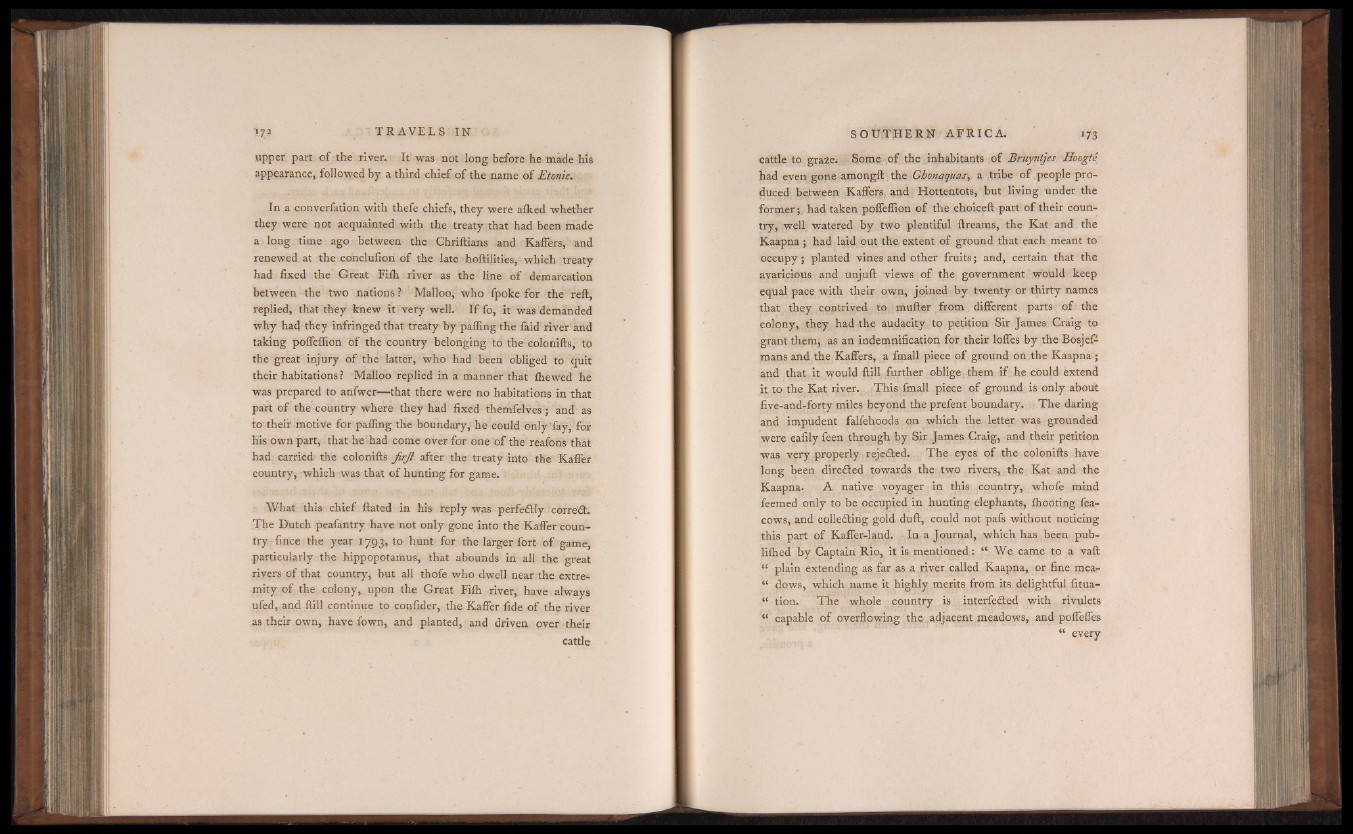
upper part of the river. It was not long before he made his
appearance, followed by a third chief of the name of Etonie.
In a converfation with thefe chiefs, they were aiked whether
they were not acquainted with the treaty that had been made
a long time ago between the Chriftians and Kaffers, and
renewed at the conclufion of the late hoftilities, which treaty
had fixed the Great Fiih river as the line of demarcation
between the two nations ? Malloo, who fpoke for the reft,
replied, that they knew it very well. I f fo, it was demanded
why had they infringed that treaty by palling the faid river and
taking poffefiion of the country belonging to’ the colonifts, to
the great injury of the latter, who had been obliged to quit
their habitations? Malloo replied in a manner that Ihewed he
was prepared to anfwer— that there were no habitations in that
part of the country where they had fixed themfelves-; and as
to their motive for palling the boundary, he could only fay, for
his own part, that he had come over for one of the reafons that
had carried the colonifts JirJi after the treaty into the Kaffer
country, which was that of hunting for game.
What this chief ftated in his reply was perfedly correft.
The Dutch peafantry have not only gone into the Kaffer country
fince the year 1793, to hunt for the larger fort of game,
particularly the hippopotamus, that abounds in all the great
rivers of that country, but all thofe who dwell near the extremity
of the colony, upon the Great Fiih river, have always
ufed, and ftill continue to confider, the Kaffer fide of the river
as their own, have fown, and planted, and driven over their
cattle
cattle to graze; Some of the inhabitants of Bruyntjes Hoogte
had even gone amongft the Ghonaquas, a tribe of people produced
between Kaffers and Hottentots, but living under the
former; had taken poffeflion of the choiceft part of their country,
welL watered by two plentiful ftreams, the Kat and the
Kaapna; had laid out the extent of ground that each meant to
occupy; planted vines and other fruits; and, certain that the
avaricious and unjuft views of the government would keep
equal pace with their own, joined by twenty or thirty names
that they contrived to mufter from different parts o f the
colony, they had the audacity to petition Sir James Craig to
grant them, as an indemnification for their Ioffes by the Bosjef-
mans and the Kaffers, a fmall piece of ground on the Kaapna;
and that , it would ftill further oblige them if he could extend
it to the Kat river. This fmall piece of ground is only about
five-and-forty miles beyond the prefent boundary. The daring
and impudent falfehoods on which the letter was grounded
were eafily feen through by Sir James Craig, and their petition
was very properly rejedted. The eyes of the colonifts have
long been directed towards the two rivers, the Kat and the
Kaapna. A native voyager in this country, whofe mind
feemed only to be occupied in hunting elephants, ihooting fea-
cows, and colle£ting gold duft, could not pafs without noticing
this part of Kaffer-land. In a Journal, which has been pub-
liihed by Captain Rio, it is mentioned: “ We came to a vaft
“ plain extending as far as a river called Kaapna, or fine mea-
“ dows, which name it highly merits from its delightful fitua-
“ tion- The whole country is interfered with rivulets
“ capable of overflowing the adjacent meadows, and poffeffes
“ every